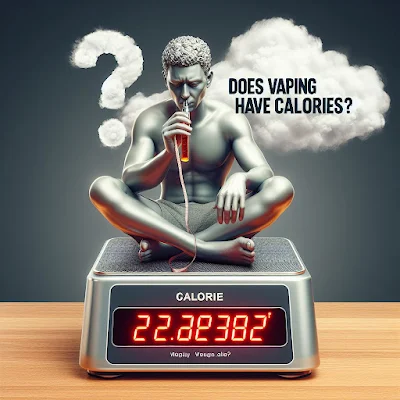Vaping is a popular alternative to smoking, but does it impact calorie intake and weight? Questions may arise regarding the calorie content of vaping and its effects on metabolism, appetite, and body composition. This article provides tips on responsible and healthy consumption, provides sources for more information on vaping and weight management, and answers the question: Does vaping have calories?
Does Vaping Make You Lose or Gain Weight?
Vaping is often regarded as a less harmful alternative to smoking; however, it carries its health risks, including the question: Does vaping lead to weight loss or weight gain, and how does it influence your metabolism, appetite, food cravings, and body composition? We'll also compare with other methods of nicotine and cannabis consumption and examine the impact of additives, sweeteners, heating, and secondhand exposure on the calorie content of vaping.
Does Vaping Burn Calories?
Vaping may influence significant caloric intake and weight by potentially increasing metabolism and energy expenditure due to nicotine's stimulant properties, including those from nicotine products. However, individual factors like age, gender, weight, and nicotine tolerance can impact these effects.
Studies suggest nicotine could enhance resting metabolic rate (RMR) by 7% to 15% and physical activity thermogenesis (PAT) by 10% to 20%.
Vaping is Not an Effective Weight Loss Strategy
Although vaping may burn some calories, it is unlikely to significantly impact daily calorie intake and expenditure concerning the number of calories consumed. Considering the average adult's calorie needs, the effect of vaping is minimal and is not expected to cause substantial weight changes in the short term. Additionally, vaping is not an effective weight loss strategy due to potential health risks, including exposure to harmful chemicals and an increased risk of addiction.
For example, vaping 20 times a day, with each puff delivering 1 mg of nicotine, could increase daily caloric intake by 9 to 40 calories.
VG / PG Flavourings and Other Ingredients of Vape Juice
Vaping electronic cigarettes involves inhaling and exhaling an aerosol, or vapor, produced by electronic devices like e-cigarettes, vape pens, or mods. These devices function by heating e-liquid or vape juice containing propylene glycol, vegetable glycerin, nicotine, and flavorings. As the liquid turns into vapour, users inhale it.
Nicotine
Nicotine, as mentioned earlier, is a stimulant, meaning it can lead to appetite suppression and increase your metabolism. However, it is also addictive, which can lead to dependence and tolerance, causing you to vape more frequently and intensely. Moreover, nicotine can interfere with insulin sensitivity and glucose metabolism, affecting blood sugar levels and fat storage.
Does Vaping Affect Appetite?
Vaping's effect on appetite and hunger hormones can vary depending on the substances involved. Nicotine, an appetite suppressant and stimulant, may lower levels of hunger hormones such as ghrelin and leptin. The impact of vaping on appetite depends on the type of substance, frequency of use, and flavor.
A healthy eating pattern that includes various foods, including fruits, vegetables, whole grains, lean proteins, and healthy fats, is recommended for effectively managing weight and appetite.
Studies suggest nicotine may reduce food intake by 5% to 10% and body weight by 2% to 3%, but individual effects may differ. Similarly, cannabis could increase food intake by 10% to 40% and body weight by 1% to 3%.
Does Vaping Cause Weight Gain or Loss?
Another possible effect of vaping on your calorie intake and weight is that it can lead to either weight gain or loss, depending on your factors and habits. This occurs because vaping may affect your nicotine or cannabis consumption, which can have varying effects on your weight.
Vaping Effects Are Not Predictable
Therefore, vaping may cause weight gain or loss, depending on your factors and habits. Some people may gain weight when they quit smoking and switch to vaping, while others may lose weight when they reduce their amount of nicotine intake. The effects of vaping on weight are not consistent or predictable, and they may depend on the type, frequency, duration, and flavor of vaping, as well as your diet, exercise, sleep, and stress levels.
To illustrate this point, here is a table that shows some hypothetical scenarios of how vaping may affect your weight based on some assumptions and estimates:
| Scenario | Vaping Type | Vaping Frequency | Vaping Duration | Vaping Flavor | Calorie Intake | Calorie Expenditure | Weight Change |
|---|---|---|---|---|---|---|---|
| A | Nicotine | 20 times per day | 1 year | Tobacco | 2000 calories per day | 2040 calories per day | Lose 4 pounds per year |
| B | Nicotine | 40 times per day | 1 year | Menthol | 2000 calories per day | 2080 calories per day | Lose 8 pounds per year |
| C | Nicotine | 20 times per day | 1 year | Vanilla | 2200 calories per day | 2040 calories per day | Gain 16 pounds per year |
| D | Nicotine | Quit vaping | 1 year | N/A | 2500 calories per day | 2000 calories per day | Gain 52 pounds per year |
| E | Cannabis | 10 times per day | 1 year | Natural | 2500 calories per day | 2000 calories per day | Gain 52 pounds per year |
| F | Cannabis | 10 times per day | 1 year | Strawberry | 3000 calories per day | 2000 calories per day | Gain 104 pounds per year |
| G | Cannabis | 5 times per day | 1 year | Natural | 2000 calories per day | 2000 calories per day | No change |
| H | Cannabis | 5 times per day | 1 year | Chocolate | 2200 calories per day | 2000 calories per day | Gain 16 pounds per year |
Cannabis Vaping
Another potential source of calories from vaping is cannabis, a plant that contains psychoactive compounds such as tetrahydrocannabinol (THC) and cannabidiol (CBD). Cannabis, commonly found in vape liquids, can stimulate appetite and contains some calories, primarily from carbohydrates and fats, although not enough to significantly influence your daily intake. Cannabis can be vaped in various forms, including dry herb, wax, oil, or e-liquid. The popularity of cannabis vaping is increasing, particularly in areas where cannabis is legal for medical or recreational use.
Does Vaping Have Calories from Cannabis?
Another concern is whether vaping adds calories from cannabis. The main question then becomes: does vaping affect the calorie count? The short answer is yes, but the actual calorie count from vaping cannabis is significantly lower than that of the cannabis itself. When you vape cannabis, you inhale only the molecules vaporized by heat instead of the entire plant material.
For example, one gram of cannabis flower contains about four calories, while one gram of cannabis oil contains about nine calories.
To illustrate this point, here is a table that shows some hypothetical scenarios of how many calories you may get from vaping cannabis based on some assumptions and estimates:
| Scenario | Cannabis Form | Cannabis Amount | Cannabis Calorie Content | Vaping Efficiency | Vaping Calorie Content |
|---|---|---|---|---|---|
| A | Dry herb | 0.5 gram | 2 calories | 50% | 1 calorie |
| B | Wax | 0.1 gram | 0.9 calories | 80% | 0.7 calories |
| C | Oil | 0.05 gram | 0.45 calories | 90% | 0.4 calories |
| D | E-liquid | 0.01 gram | 0.09 calories | 95% | 0.08 calories |
How Does Vaping Cannabis Affect Metabolism?
As you can see, vaping cannabis may have some calories, but not enough to make a significant difference in your daily intake and expenditure. However, vaping cannabis may have other effects on your metabolism, appetite, and weight, as discussed earlier. Vaping Cannabis may stimulate your appetite and increase your hunger hormones, which can make you eat more and gain weight.
Side Effects of Cannabis Vaping
Vaping cannabis may also modulate your endocannabinoid system, which can affect your energy balance and lipid metabolism, which can make you burn more fat and lose weight. Vaping cannabis may also expose you to harmful chemicals, such as pesticides, solvents, and contaminants, which can damage your lungs, liver, and brain.
Can You Manage Weight by Vaping Cannabis?
Vaping cannabis may also increase your risk of addiction, dependence, and withdrawal symptoms, such as anxiety, depression, and insomnia. Therefore, if you want to manage your weight, vaping cannabis is not the answer. The best way to manage your weight is to follow a healthy lifestyle with a balanced diet, regular exercise, adequate sleep, and stress management.
Select the Best Vape Products
However, if you still decide to use a vape, the best choice is on the GypsyVapes website. On this site, you can find various vapes of different styles and brands at low prices and fast delivery. For example, you can choose one of these vapes:
SMOK Micare - This vape is designed for use with cartridges containing nicotine or cannabis. It features a compact and elegant design, a powerful 700mAh battery, and a charge level indicator. It also has adjustable power from 5 to 30 watts and preheating for better vaporization.
-
Yocan Vane This vape is designed for use with dry herbs such as cannabis. It has a modern, portable design, ceramic heating chamber, and OLED display. The temperature can be adjusted from 200 to 480 °F, and it automatically shuts off after three minutes of inactivity.








0 Comments